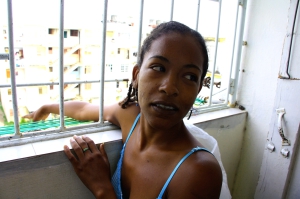In all countries of the world, it is difficult to fight against racism. However, in Cuba it is especially difficult. Although racism is a part of reality of today’s Cuban society, the authorities try to avoid any public discussion on this issue.
Discrimination occurs for example in access to housing. Afro-Cubans have less contacts among the state authorities, which makes it difficult for them to get decent housing or to carry out any arrangements related to it. Something as simple as not having the right contacts can make life in Cuba very difficult.

As for the access to health, many Afro-Cubans complain that they have to endure longer waits to be attended. They are five times more likely to be put in prison than white people. They are less likely to find a job in the private tourism sector, since European tourists are expected to prefer to be served by white people. Setting up a private business is also more difficult for Afro-Cubans since very few of them have relatives outside Cuba and thus nobody can send them money they could start with. In contrast, white people have often families abroad that provides them with resources which enables them a higher standard of living.
On the other hand, the media foster stereotypes: Afro-Cubans or mestizos appear to be associated with crime or criminal activity, and only acquire a positive acknowledgment in certain sectors such as sports or music, while white people form the group of “normal” people.
There are no updated figures on the number of Afro-Cubans, mestizos, and white people that make up a Cuban society. According to the study “The color of the skin” based on population and housing census in 2012, white people represent 64.1% of the society, mestizos 26.6% and Afro-Cubans 9.3%. However, other sources point out that the percentage of white people is between 40 and 45% and estimate that the majority of the population consists of Afro-Cubans and mestizos.
This year, the Center for Political Studies and Alternatives for the Democratic Transition of Cuba (CEPATD) organized a campaign to raise awareness of the problem of racism in the country. In addition, CEPATD, together with other organizations, achieved to form for the first time in 60 years a coalition defending the rights of Afro-Cubans, Coalition for Non-Discrimination and Defense of the Human Rights of Cuban Afro-descendants (DDHAC Coalition); Integrated by civil society organizations and capable of generating a relevant and timely political debate on racial discrimination in Cuban society. Through media and communication means such as web pages, newsletters, digital magazines and independent media, the coalition was able to spread its message to about 20 000 people.
The Coalition also conducted a survey to gather opinions on racial discrimination in Cuba. One of the organizers says: “In order to know a complete range of opinions regarding racism, the campaign carried out by the DDHAC Coalition conducted a survey, asking people in the streets and civil society actors in the provinces of Havana and Matanzas, to obtain a sample of the view on this phenomenon.” Questions were for example “Is there a social discrimination in Cuba?”, “How does it manifest itself in your environment?” or “What do state institutions do to eradicate this social problem?”
It is important to note that the Cuban authorities have reacted negatively to this campaign which makes racism visible within Cuba. Coalition collaborators are being subjected to short-term arrests, coercion and threats against them and their families.
However, this initiative shows that public discussion on racism in Cuba is inevitable and necessary. To fight against racism, it is not enough to change the legislation, it requires a change in the society. And the independent groups in Cuba such as the CEPATD and the DDHAC Coalition are giving an impulse to make these changes a reality.

Leave a comment